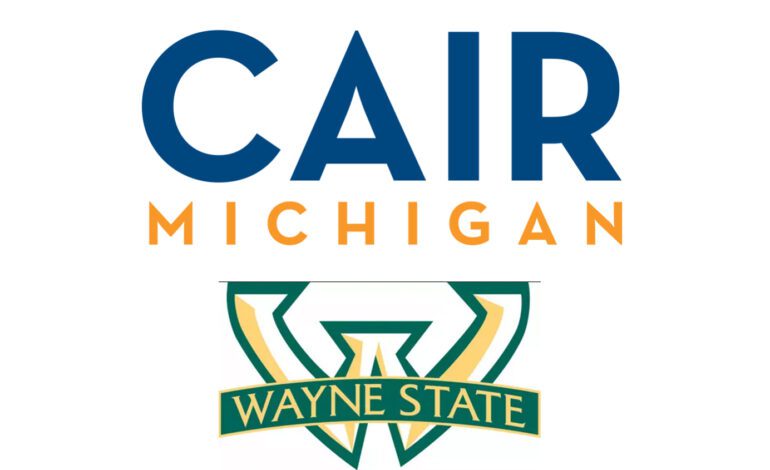DETROIT — The Michigan chapter of the Council on American-Islamic Relations (CAIR-MI) has filed a formal complaint with the Michigan Department of Civil Rights (MDCR), accusing Wayne State University (WSU) campus police of racial and religious discrimination against Arab and Muslim students. The complaint follows a pro-Palestinian student protest earlier this month that allegedly prompted discriminatory police behavior.
According to the complaint, campus police at the Detroit-based university forcibly removed Arab and Muslim students from a peaceful protest denouncing the genocide in the Palestinian occupied territories. The April 2 demonstration, organized by Students for Justice in Palestine (SJP), took place outside the WSU student center. The complaint states that officers also blocked other students from joining the protest, using physical force.
The protest was part of a broader wave of campus demonstrations across the United States, where students have increasingly called for their universities to divest from companies profiting from Israel’s military actions in Gaza. At several institutions, these demonstrations have drawn heightened police presence and have led to similar allegations of suppression and profiling — particularly against Muslim and Arab students.
CAIR’s complaint alleges that the officers involved displayed a pattern of racially and religiously motivated conduct aimed at harassing and intimidating Arab and Muslim students. These actions, the organization argues, represent a clear violation of both federal civil rights statutes and Michigan state law.
“This isn’t about one officer or one isolated incident; it’s about a systemic culture of discrimination that has fostered a hostile environment for Muslim and Arab students at Wayne State,” said Dawud Walid, executive director of CAIR-MI. He emphasized that the organization would continue to advocate for the affected students, who “deserve to be treated with dignity and equality, not suspicion and surveillance.”
CAIR-MI also said it sent letters to WSU leadership asking for a meeting “to discuss how the university intends to address the misconduct and prevent further civil rights violations.”
Eight incidents cited in the complaint
CAIR’s submission to the MDCR outlines eight incidents between late 2023 and April 2025. Most of them, CAIR asserts, are documented through video evidence or public statements by elected officials.
Among the allegations:
-
Students were stopped or removed from campus spaces solely based on wearing a keffiyeh or appearing Arab or Muslim, without violating any laws.
-
Officers allegedly harassed students, asked for immigration documents without legal grounds and made threatening remarks. In one case, an officer reportedly told a student, “You’re lucky I’m wearing this uniform.”
-
An unnamed female officer reportedly barred students from entering the student center without explanation.
-
Three identified officers allegedly prevented a student from rejoining a public campus event after prayer.
CAIR stated that these actions reflect a troubling national trend. Civil rights advocates and legal scholars have warned of widespread over-policing and surveillance of Muslim and Arab students, particularly in contexts involving Palestine-related advocacy. Legal experts say such actions risk chilling free expression and disproportionately burden marginalized student groups.
Attorney Amy Doukoure, legal counsel at CAIR-MI, criticized WSU police for engaging in actions that allegedly “contained in this complaint are not only morally repugnant — they are legally indefensible.”
“When campus police officers demand passports, target students for wearing keffiyehs or use physical force on peaceful protesters, they are violating core constitutional protections,” she said. “The law is clear — and we are prepared to pursue all available legal remedies to protect these students.”
Doukoure added that CAIR is prepared to pursue all available legal remedies to protect the rights of affected students.
“The law is clear, and we are ready to act,” she said.
Wayne State responds
In response to the allegations, Wayne State Associate Vice President of University Communications Matt Lockwood issued a statement defending the professionalism of the campus police department. He said the university’s officers are “nationally recognized for their measured approach to maintaining a safe environment that supports learning, research and personal growth.”
Lockwood stated that while the university cannot comment on specific claims, “we believe any allegation suggesting a widespread pattern of misconducts are without merit.”
He added that WSU administration regularly engages with students, faculty and community groups to discuss both successes and concerns. He emphasized that the university takes all complaints seriously and has established protocols for assessment and investigation. The university, he noted, regularly shares reporting resources through the Office of the Dean of Students and the Office of Equal Opportunity.
“We remain committed to supporting the rights of all students, faculty and staff to express themselves and worship freely — so long as such expression does not disrupt university operations or violate policy,” Lockwood said. “We will continue to uphold the law in a content-neutral manner while protecting everyone’s rights.”
Status of the complaint
Michigan Department of Civil Rights Communications Director Vicki Levengood told The Arab American News that the department currently does not have the CAIR complaint listed in its database, but acknowledged it “may be under review.”
Meanwhile, CAIR confirmed that it had also sent letters to the WSU administration requesting a meeting to explore ways to prevent further civil rights violations on campus.






Leave a Reply